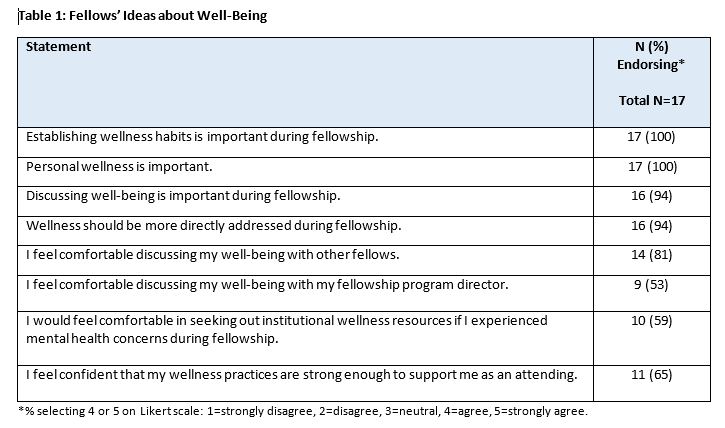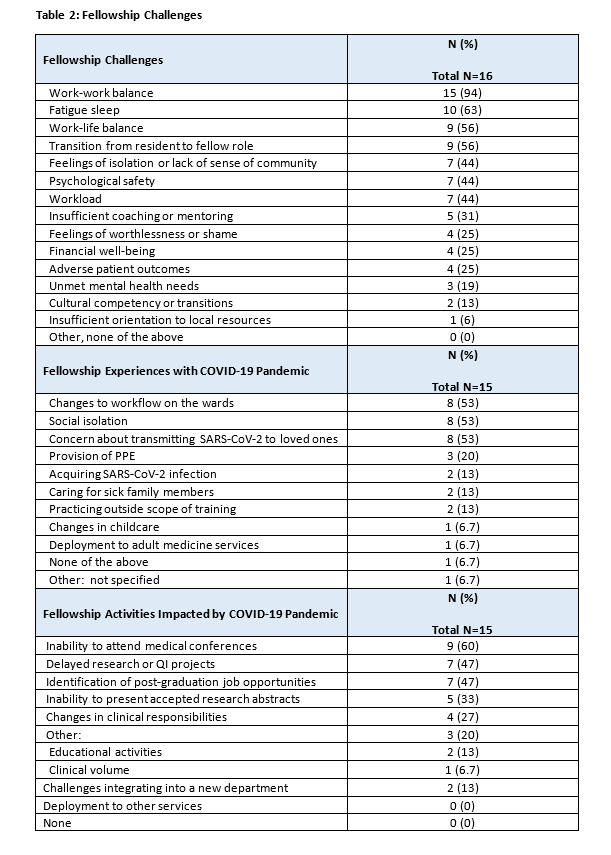Medical Education: Fellow
Category: Abstract Submission
Medical Education 8 - Medical Education: Fellow II
228 - Exploring well-being among pediatric subspecialty fellows
Sunday, April 24, 2022
3:30 PM - 6:00 PM US MT
Poster Number: 228
Publication Number: 228.332
Publication Number: 228.332
Dana M. Foradori, Cleveland Clinic Lerner College of Medicine, Cleveland, OH, United States; Sarah Worley, Cleveland Clinic Children's, Cleveland, OH, United States; Emily N. Ashcraft, Cleveland Clinic Children's, Memphis, TN, United States; Sangeeta Krishna, Cleveland Clinic Children's, Cleveland, OH, United States

Dana M. Foradori, MD, M.Ed
Assistant Professor of Pediatrics
Cleveland Clinic Lerner College of Medicine
Cleveland, Ohio, United States
Presenting Author(s)
Background: Burnout is prevalent among physicians-in-training. The ACGME emphasizes support for trainee well-being, yet a paucity of literature explores the needs of fellows.
Objective: We aim to describe the state of well-being and associated needs of pediatric fellows, whom we hypothesize are a distinct population of advanced learners with unique professional and personal challenges.
Design/Methods: To develop the assessment tool, we iteratively revised a survey with feedback from program directors (PDs), core faculty, recent fellows, and statisticians at an academic center in the Midwest. We queried demographics, perceptions of well-being, well-being habits, fellowship and pandemic challenges, and support systems, as well as preferred learning modalities and topics. We assessed burnout with a standardized single-item burnout measure and professional fulfillment with the Stanford Professional Fulfillment Index. We emailed the 33-question survey to pediatric fellows. Descriptive statistics were reported.
Results: Response rate was 68% (17/25), with majority female, partnered, and at PGY-2/3 levels. Burnout was reported by 38% and professional fulfillment by 50%. Table 1 shows perceptions about well-being. While all fellows endorsed the importance of well-being, fewer felt confident in their practices or in seeking support from their PD (53%) or mental health services (59%). Fellows most frequently reported challenge with work-work balance (94%), referring to competing clinical, teaching, and scholarly responsibilities, and reported a broad range of additional challenges (Table 2). Fellows discussed well-being with co-fellows, family, friends, PDs, and mentors. Well-being support habits included exercise, nutrition, and family and social activities. Table 3 reflects preferred educational topics with prioritization of fatigue mitigation, time management, mentorship, and mindfulness. Fellows preferred learning via workshops, small groups, and mentorship.Conclusion(s): Fellows experience both burnout and suboptimal professional fulfillment. All fellows recognized the importance of well-being, but fewer were confident in their practices or comfortable seeking programmatic support. They endorsed multiple broad challenges, with nearly all reporting challenge in work-work balance, and preferred interactive learning about topics that mirrored challenges.
Results support a programmatic approach to supporting the specific well-being needs of fellows and will inform the development of a local longitudinal well-being curriculum and creation of peer support circles for pediatric fellows.
Table 1: Fellows' Ideas about Well-Being
Table 2: Fellowship Challenges
Objective: We aim to describe the state of well-being and associated needs of pediatric fellows, whom we hypothesize are a distinct population of advanced learners with unique professional and personal challenges.
Design/Methods: To develop the assessment tool, we iteratively revised a survey with feedback from program directors (PDs), core faculty, recent fellows, and statisticians at an academic center in the Midwest. We queried demographics, perceptions of well-being, well-being habits, fellowship and pandemic challenges, and support systems, as well as preferred learning modalities and topics. We assessed burnout with a standardized single-item burnout measure and professional fulfillment with the Stanford Professional Fulfillment Index. We emailed the 33-question survey to pediatric fellows. Descriptive statistics were reported.
Results: Response rate was 68% (17/25), with majority female, partnered, and at PGY-2/3 levels. Burnout was reported by 38% and professional fulfillment by 50%. Table 1 shows perceptions about well-being. While all fellows endorsed the importance of well-being, fewer felt confident in their practices or in seeking support from their PD (53%) or mental health services (59%). Fellows most frequently reported challenge with work-work balance (94%), referring to competing clinical, teaching, and scholarly responsibilities, and reported a broad range of additional challenges (Table 2). Fellows discussed well-being with co-fellows, family, friends, PDs, and mentors. Well-being support habits included exercise, nutrition, and family and social activities. Table 3 reflects preferred educational topics with prioritization of fatigue mitigation, time management, mentorship, and mindfulness. Fellows preferred learning via workshops, small groups, and mentorship.Conclusion(s): Fellows experience both burnout and suboptimal professional fulfillment. All fellows recognized the importance of well-being, but fewer were confident in their practices or comfortable seeking programmatic support. They endorsed multiple broad challenges, with nearly all reporting challenge in work-work balance, and preferred interactive learning about topics that mirrored challenges.
Results support a programmatic approach to supporting the specific well-being needs of fellows and will inform the development of a local longitudinal well-being curriculum and creation of peer support circles for pediatric fellows.
Table 1: Fellows' Ideas about Well-Being

Table 2: Fellowship Challenges

